Kick-off Symposium for the JST Mirai Program, Entitled “Co-creation of Individual and Collective Well-being: Measuring the States of Spaces and Communities to Support Individuals’ Optimization,” Was Held
On November 5th, 2021, the kick-off symposium for the JST Mirai Program, entitled “Co-creation of Individual and Collective Well-Being: Measuring the States of Spaces and Communities to Support Individuals’ Optimization,” was held.
Prof. Shoko Wakamiya (Associate Professor, Nara Institute of Science and Technology) served as the moderator, and the representative of this project, Professor Yukiko Uchida (KRC), first explained the overall purpose of this project: to explore the factors that create “spaces” to support the diverse individuals’ optimization. For this purpose, four groups will collaborate with each other to investigate the factors of well-being and develop technologies which can evaluate and visualize those factors.
After explaining the overall purpose, Prof. Uchida presented the topic of “approached to subjective indicators” from the perspective of the Subjective Indicators Group, one of the four groups mentioned above. She proposed that well-being would be positioned as a new “measure” of “mental” satisfaction, and a “space” as something that creates a collectively shared reality, such as a workplace or local community. She then pointed out the need to simultaneously measure and understand states of “individuals” and “spaces” as well as the relationships in between, when considering the well-being of others and consensus building within a group. Therefore, the overall objective of this project is to theorize the interaction between “individuals” and “spaces” by designing subjective / objective indicators based on existing knowledge, and connecting them with advanced technologies.
Next, from the perspective of the Urban Sensing Group, Prof. Yuji Yoshimura (Project Associate Professor, Research Center for Advanced Science and Technology, University of Tokyo) gave the first presentation entitled “The Potential of AI Big Data in Cities.” Prof. Yoshimura began by defining a “space” as a city, especially a pedestrian space. He pointed out that in the field of architecture, people’s well-being has rarely been considered. Therefore, in this project, his group proposes to clarify the benefits of urban pedestrianization, which is currently being promoted in many parts of the world, from the view of well-being by utilizing mapping technology of pedestrian space distribution. Prof. Yoshimura also discussed the need for data visualization based on findings in data science in order to share results with non-professionals and facilitate communication and dialogue with the general public.
In the second presentation, Dr. Masataka Nakayama (Program-specific Assistant Professor, KRC) spoke on the theme of “Social Attractor Visualization Technology: SATETSU,” from the perspective of the Physio-Sensing Group. According to Dr. Nakayama, “spaces” can be defined as actions that cannot be reduced to an individuals, but arise emergently from interactions between individuals, and “well-being” as emotionally good states. He also pointed out that the well-being of a “space” has sustainability to recover, even if the condition of each individual in the space temporarily falls down. Then, he proposed an algorithm called SATETSU as a tool to visualize these variable dynamics. As an example of the application, he introduced a case study of measuring the co-variation of emotional valence between client and counselor from text data in SNS counseling. The evaluation of each session by professionals in SNS counseling and patterns of co-variation of emotional valence indicated that SATETSU will be developed as a tool to visualize the dynamics of “spaces” by estimating states of “individuals” from physiological indicators and textual data, as seen in the differentiation between “good spaces” and “bad spaces.”
In the third presentation, from the perspective of the Social Sensing Group, Prof. Eiji Aramaki (Nara Institute of Science and Technology) gave a presentation entitled “The Future Woven by Social Sensing.” He began by defining “spaces” as living with 45 million active SNS users, and “well-being” as living with such “spaces.” It was shown that there is a possibility to create a better society by giving shape to the voice of “spaces” through the estimation of emotions and inner thoughts using natural language processing techniques Prof. Aramaki reported that the real-world application of the measurement results and an appropriate SNS design for “spaces” will be important.
Next, Prof. Yukino Baba (Associate Professor, Faculty of Engineering, Information and Systems, University of Tsukuba) gave the fourth presentation entitled “Human Computation Connecting Individuals and Groups.” She defined “spaces” as a platform for people to interact and be controlled by the system, and “well-being” as a state of being helpful to others and feeling respected by others. According to Prof. Baba, it has been shown that human computation has a high potential to contribute to the improvement of “spaces” by taking up the opinions of group members, and generating and selecting ideas for solutions, which go beyond mere majority voting. In addition, encouraging people to actively participate in society and speak up, and thus feel that they have contributed to the improvement of states of “spaces” lead to an enhancement in people’s well-being.
Finally, in addition to the above presenters, as discussants, Dr. Nobuki Ito (Panasonic Corporation) and Mr. Kensuke Nakajima (Mitsubishi UFJ Research and Consulting Co., Ltd.) participated in the panel discussion on “Challenges of Co-creating Individuals and Collective Well-being.” Dr. Ito commented on each presentation based on his experience in product development, considering working style in the workplace. Mr. Nakajima spoke about the efforts to improve well-being in Scandinavia, based on his experience at the Ministry of Foreign Affairs of Denmark. Then, a lively discussion moderated by Prof. Uchida ensued, which focused on three issues: how we should deal with the possibility that “spaces” can become negative, how urban development in Japan should be promoted, and how we can create better “spaces” in the workplace.
Each presenter and discussant came from a different field of expertise. However, in this symposium, it was recognized that all of them had the same aspiration toward one major goal: “Co-creation of Individual and Collective Well-being.” The results of a questionnaire showed that the participants were very satisfied with the symposium.
・A video of the presentation by Prof. Uchida as the representative of this project is available on the website (Japanese):
https://ocw.kyoto-u.ac.jp/course/1049/
・This project’s website (Japanese version only):
https://sites.google.com/view/co-wellbeing/top
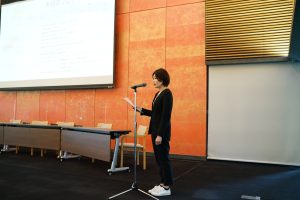
Prof. Shoko Wakamiya (Associate Professor, Nara Institute of Science and Technology)
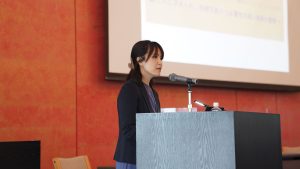
Professor Yukiko Uchida (KRC)
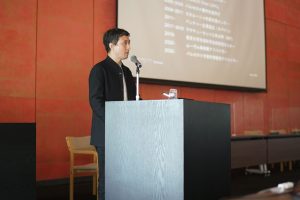
Prof. Yuji Yoshimura (Project Associate Professor, Research Center for Advanced Science and Technology, University of Tokyo)
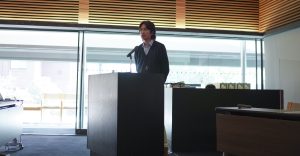
Dr. Masataka Nakayama (Program-specific Assistant Professor, KRC)
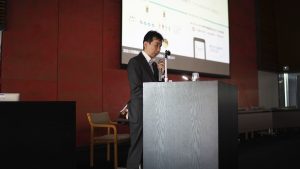
Prof. Eiji Aramaki (Nara Institute of Science and Technology)
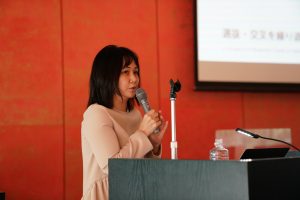
Prof. Yukino Baba (Associate Professor, Faculty of Engineering, Information and Systems, University of Tsukuba)
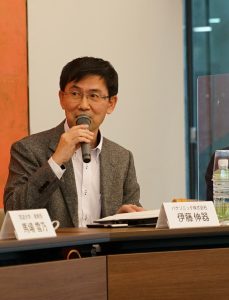
Dr. Nobuki Ito (Panasonic Corporation)
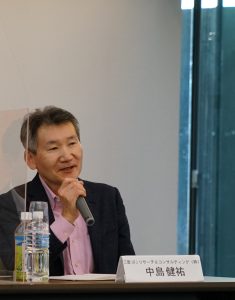
Mr. Kensuke Nakajima (Mitsubishi UFJ Research and Consulting Co., Ltd.)
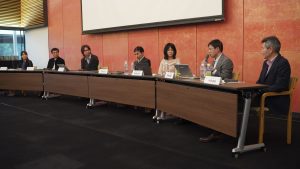
Panel Discussion
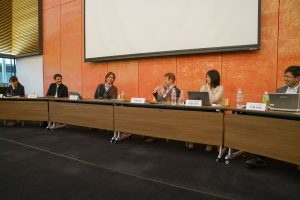
Panel Discussion
2021/12/15